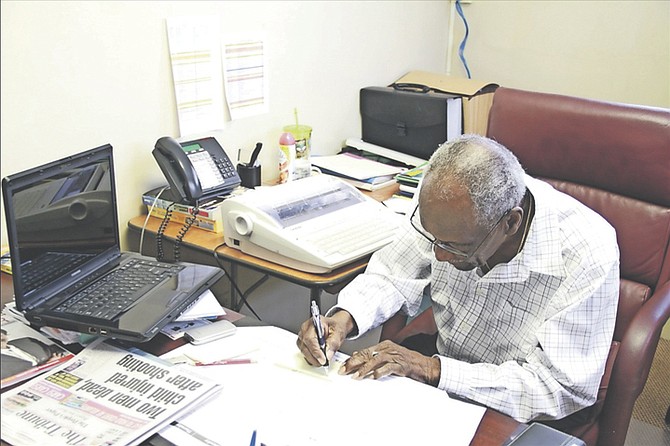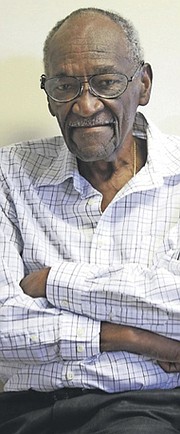Paul Thompson came to the Bahamas in 1951 and remains optimistic the issues of crime plaguing the country today can be solved. Photo: Tim Clarke
Former Assistant Police Commissioner Paul Thompson continues his series on policing in the Bahamas with a look at the people who influenced his career
Paul Thompson is the quintessential policeman. His career spanned the modern development of the Bahamas - from colonial times to the challenges of nationhood.
Born in a small farming village in Trinidad, he was recruited by the Royal Bahamas Police Force in 1951. He spent most of his time on the force in the Criminal Investigation Department, retiring in 1981 as an Assistant Commissioner.
He then began a second career as head of security for the Paradise Island Resort & Casino, returning to the police force as a civilian training officer in 1998, and in 2002 was appointed general manager of Wemco Security.
Five years later he set up his own security company - Paul Thompson & Associates. Now in his 80s, he remains active in security work.
When my memoir - A Policeman’s Story - was published in 2013, The Tribune’s publisher Eileen Dupuch Carron called it “an interesting account of life in the Bahamas from the early sixties through independence and the drug wars to the present”.
“It was only by a fluke that (Thompson) eventually became a Bahamian police officer,” she wrote. “He was rejected several times, the first because he was an inch shorter than the required height. However, his prowess at sports eventually turned his fortunes.”
At Cunupia Government School in Trinidad I excelled in sports - soccer, cricket, track and table tennis. I would have been accepted in a high school or college, but my family could not afford it, so I left school at 14 to raise hogs and chickens and deliver bread and cakes.
One Sunday morning after a soccer match, I picked up the Trinidad Guardian and saw a story indicating that the Bahamas had sent a police officer named Augustus ‘Gussie’ Roberts to recruit personnel.
When I presented myself for evaluation, I was an inch less than the approved height of 5ft 9in. A sergeant, who knew me from sports, advised me to go to the gym and do some stretching exercises. The following day I went back to the recruiting centre, and was able to make the extra inch.
The final stage of the recruiting process was an interview with Gussie Roberts. He told me that 12 men were needed but there were 18 candidates, and I was not one of those selected.
But the following week a police friend asked if I was still interested and I immediately accepted. My departure for Nassau was scheduled for Easter Saturday morning in 1951 on Pan American World Airways. It was my first flight ever. We overnighted in Jamaica and arrived in Nassau on Easter Sunday at the Oakes Field airport.
Over the years, competitive sports and law enforcement have been the most important influences on my life, ever since those early days in Trinidad.
Barbadian Ralph Legall was an outstanding sportsman who played cricket, soccer, table tennis and tennis for the Trinidad and Tobago national teams in the 1950s. I trained with him at the Woodbrook Youth Centre in Port of Spain.
Randolph Burroughs and I were both apprentices at Trinidad Government Railways in the late 1940s, when we played cricket and soccer together. Burroughs went on to become Trinidad’s Commissioner of Police in 1978.
Roy Armbrister was my sports mentor in the Bahamas. He excelled in cricket, soccer, boxing, swimming and track and field, and was considered the greatest Bahamian sportsman of all time by many.
My early police training was supervised by Carlton Price Wentworth, who was seconded from Trinidad to the Bahamas Police College. Other outstanding officers who helped train me included Stanley Moir, Albert Miller, Salathial Thompson and Wenzel Granger - all highly respected in their day.
Over the years I also worked closely with senior FBI agent Robert Peloquin, who specialised in the investigation of organised crime. Peloquin became a legendary figure and his firm, Intertel, was responsible for security at Resorts International. He was instrumental in my appointment as head of security at the Paradise Island Resort & Casino following my retirement from the police force in 1981.
Among Bahamian leaders, I had the greatest respect for Kendal Isaacs as a man of unflinching character, integrity and principle. He was not a good politician, but he was certainly a great judge and prosecutor. I also learned a lot from the writings of Sir Etienne Dupuch, who was publisher of The Tribune from 1919 to 1972. He was very courageous and his brother, Eugene, was a superlative defence attorney. Even when off-duty I would attend court to hear him address a jury.
A F Adderley was president of the Bahamas Cricket Association for many years and I was honoured to be able to speak to him from time to time. His son, Paul, was one of the best lawyers in the Bahamas and represented me gratis at an inquest into the death of a man I had arrested for multiple rapes. Orville Turnquest was also a big cricket fan and a good friend.
During my early career I had the opportunity to interact with outstanding magistrates like Wilton Hercules, John Bailey, Kenneth MacAllister, Max Thompson and Emmanuel Osadbay. It was always enlightening to visit their courts and read their judgements in important cases.
The Royal Bahamas Police Force was my university. It is where I received my professional education. It is also where I learned about teamwork, love for neighbour and colleagues, handling life’s ups and downs, self-discipline and setting high personal standards.
I came to the Bahamas a boy, and it was the Royal Bahamas Police Force that made me a man.
NEXT WEEK: undercover operations and the need to know
Comments and responses to insight@tribunemedia.net






Comments
Use the comment form below to begin a discussion about this content.
Sign in to comment
OpenID